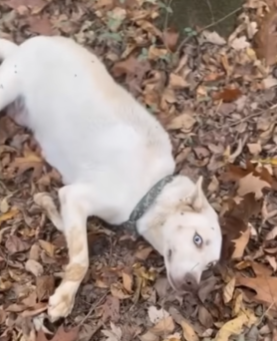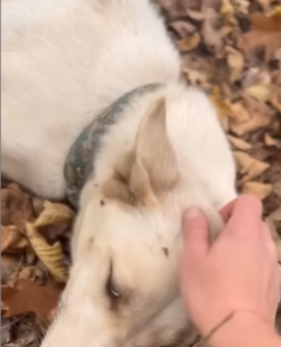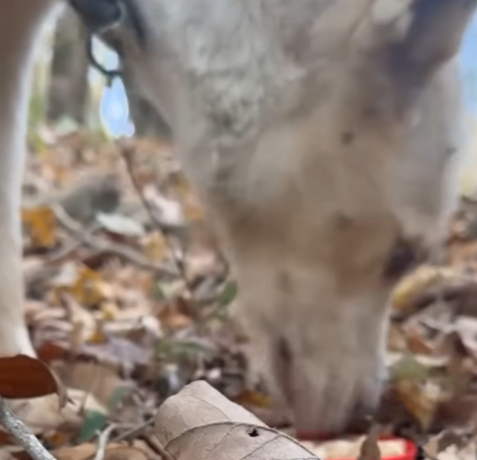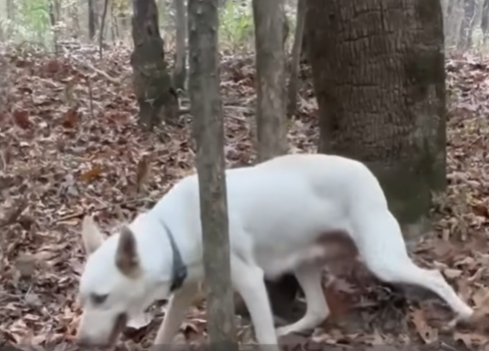
The call came just after sunrise—another report of a stray dog wandering the outer edge of the forest near the old farm road. Locals had seen her for days: thin, skittish, always searching the ground for scraps. No one could get close. She ran from every person, every sound, every hand.
But something in her behavior was different. She wasn’t wandering aimlessly. She moved with purpose, as if she had somewhere to be—someone depending on her.
When we arrived with our rescue gear, the forest was still damp with morning dew. The air smelled of pine, earth, and the faint sweetness of early blossoms. Birds sang overhead, but beneath their song we heard something else:
A soft, desperate cry.
The dog emerged slowly from behind a thicket of tall grass. She was small, no more than two years old, her ribs showing through her thin coat. Her ears were flattened with fear, but her eyes—wide, dark, and pleading—never left us.
She didn’t bark.
She didn’t growl.
Instead, she paced anxiously, glancing back into the dark woods, then back at us, as if begging for help but terrified of asking.
One step toward her, and she backed away.
But she didn’t run.
She waited.
“She’s trying to tell us something,” I whispered.
The dog sniffed the air, trembled, then turned and trotted deeper into the trees—stopping every few steps to make sure we were following.
“She wants us to come,” my partner said. “She’s leading us.”

We shared a look.
And then we followed her into the forest.
The deeper we went, the quieter it became. Sunlight barely touched the ground through the thick canopy. Fallen branches cracked under our boots. She stayed ahead of us, glancing back constantly, anxiety radiating off her fragile body.
After several minutes, she stopped beside a rotted tree trunk that had fallen long ago, leaving a hollow space underneath. She looked at us, whining softly—almost apologetically—then dipped her head inside.
The crying became unmistakable.
Tiny, weak whimpers. The sound of babies too young to understand suffering.
My heart clenched.
We dropped to our knees and peered into the darkness beneath the log.
Four newborn pups.
Their eyes were still closed, their bodies frail and shaking. They huddled together for warmth, their bellies sunken from hunger. A small nest—barely a pile of leaves and torn grass—was all their mother had been able to create to protect them from the cold forest nights.
The mother dog lay beside the log, panting, exhausted, watching us with fearful hope. She was painfully thin—far too thin to produce enough milk for her babies. Her bones jutted beneath her fur, signs she had gone hungry for days, perhaps weeks.
She had led us here because she could no longer do it alone.
These pups were starving.
She was starving.
And she had chosen to trust us with the most precious things in her world.
Gently, I reached my hand toward her. She flinched but did not back away. Her tail curled tightly between her legs as she sniffed my fingers, trembling.
“It’s okay, sweetheart,” I whispered. “We’re here to help. We’ll take care of them. And you.”

She gave a tiny, desperate whine—then lowered her head, as if surrendering her fear.
It was the moment she allowed herself to hope.
We collected the pups carefully, wrapping each one in a warm towel. Their cries were thin and fragile, but the moment they felt heat, they clung to it. The smallest one—barely larger than my hand—struggled weakly, his breath shallow.
The mother nosed each pup as we lifted them, anxiety mixing with trust. She followed every movement we made, her eyes never leaving them. When we placed the pups into a padded rescue carrier, she climbed into my lap without hesitation, as if fearing the distance between them.
“She’s so scared to lose them,” I murmured.
“Let’s get them to the van,” my partner said. “Fast.”
But before we could stand, the mother began to shake violently.
Not with fear.
With exhaustion.
Her legs buckled. She collapsed onto the mossy ground, her eyes fluttering. She had been surviving on pure instinct, ignoring her own hunger just to keep searching for scraps to bring back to her babies.
She was at her limit.
I scooped her into my arms. She was feather-light, like holding a shadow.
“It’s okay,” I whispered. “We’ve got you. You don’t have to fight alone anymore.”
She relaxed against my chest—not because she trusted me completely, but because she had no strength left to stand.
She had given everything for her babies.
Now it was our turn to give everything for her.
At the rescue center, the pups were placed in an incubator and bottle-fed every two hours. Two needed oxygen support. One had dangerously low body temperature. They were fragile, but fighting.
The mother—whom we named Lila—slept for nearly 24 hours straight. When she finally woke up, she panicked, searching for her pups. The moment we carried them to her, she pressed her nose to each one, whining with relief.
She curled her body around them protectively, even though she was still too weak to nurse them. We continued bottle-feeding, but now Lila kept them warm, cleaned them gently, and watched over them with the fierce love of a mother who had survived too much to give up now.
Day after day, they grew stronger.
The smallest one began to respond to the milk. The others opened their eyes and squeaked whenever Lila nuzzled them. Their tiny paws stretched. Their bellies filled. Their breath became steady and strong.
And Lila?
She bloomed.

Her eyes brightened. Her ribs became less visible. Her fur regained softness. She wagged her tail timidly whenever she saw us—just once or twice at first, then more with each passing day.
She still flinched at sudden movements. She still watched the door anxiously whenever someone entered the room. But she no longer trembled in fear.
She knew she was safe.
She knew her puppies were safe.
And she knew she had not been wrong to lead us into the forest that morning.
Weeks later, as the pups tumbled across the grass for the first time, Lila sat beside me, leaning gently against my leg. Her eyes followed her babies with pride and relief.
“You saved them,” I whispered to her.
She lifted her head and touched her nose to my hand—the same hand she had once been terrified to approach.
No words were needed.
She remembered the hunger.
She remembered the cold nights.
She remembered the loneliness.
But now, she had a home.
Her pups had a future.
And she would never again walk through the woods alone, desperate and afraid.
Because the day she found us was the day her life—and theirs—truly began again.



